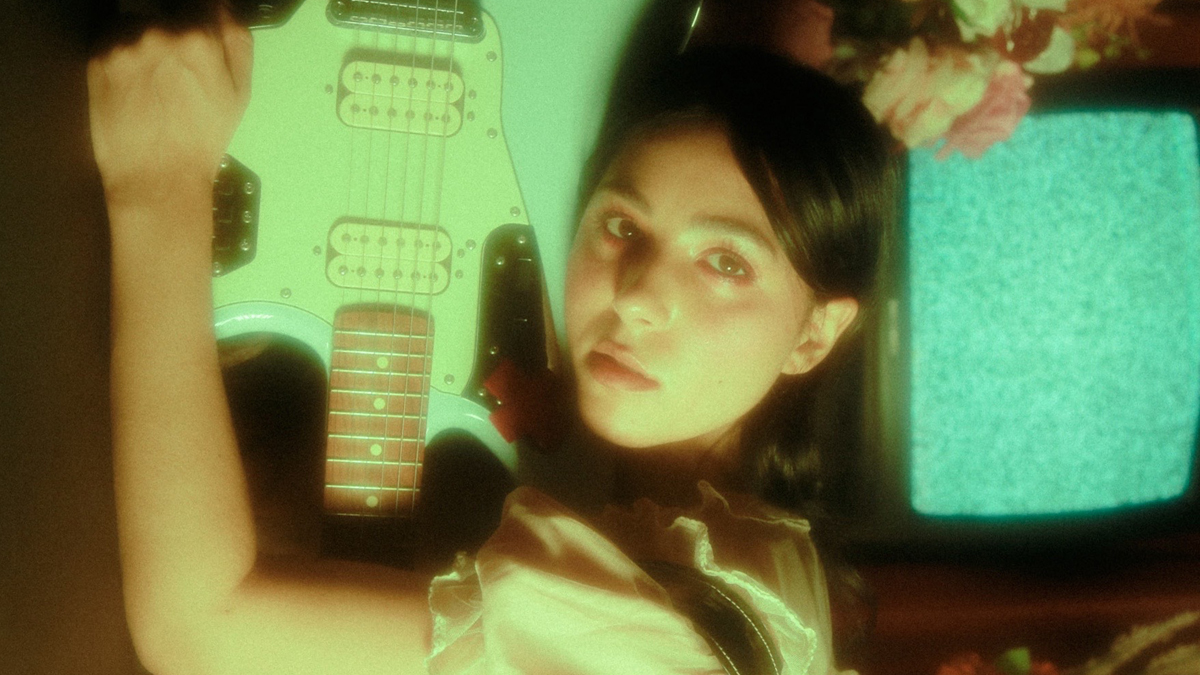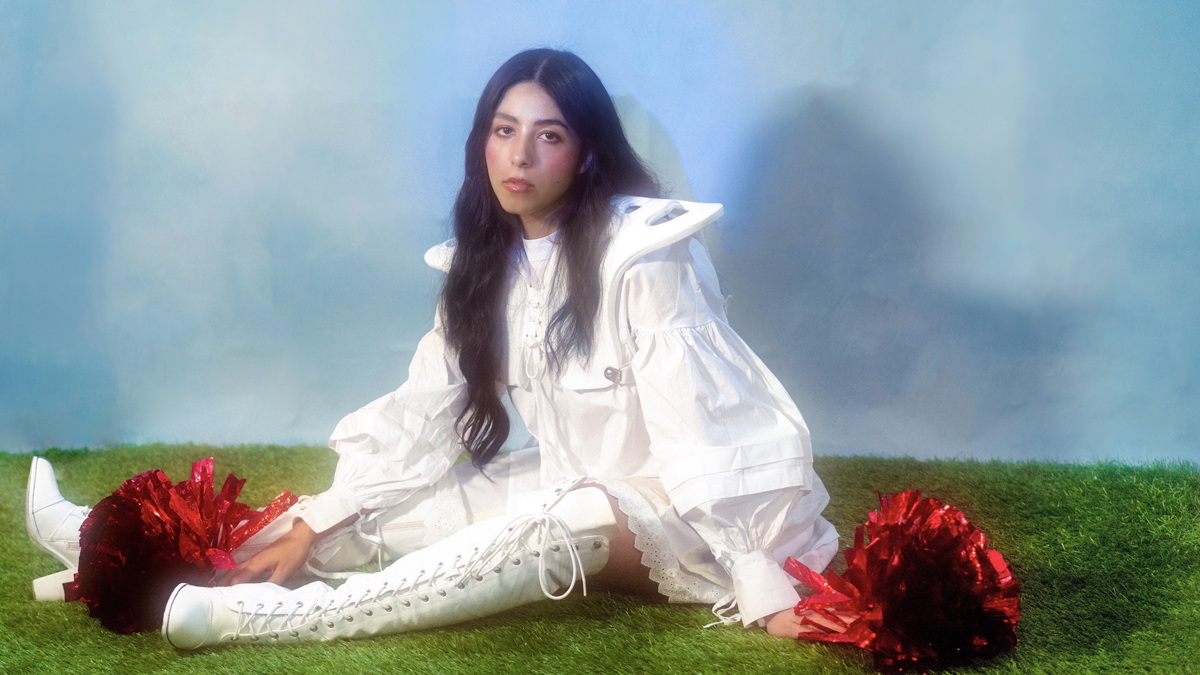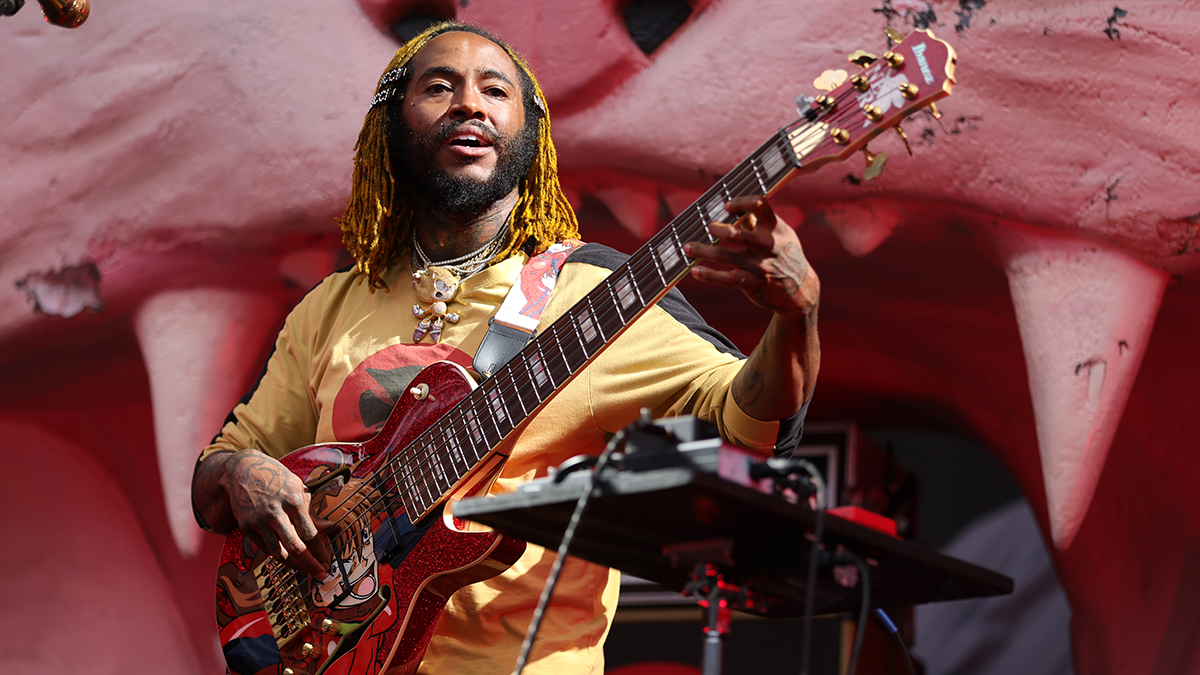Pom Pom Squad: "There are varying degrees and styles of how somebody can play guitar. It’s not a one-size-fits-all"
Mia Berrin breaks down toying with tropes on her new LP Death of a Cheerleader, the guitars that made it onto the record and how her affinity for all things grunge began

All the latest guitar news, interviews, lessons, reviews, deals and more, direct to your inbox!
You are now subscribed
Your newsletter sign-up was successful
As a musician, Mia Berrin, who fronts the Brooklyn, New York-based punk rock band, Pom Pom Squad, is savvy, kind-hearted and compelling. With the release of the band’s new LP, Death of a Cheerleader, Pom Pom Squad has been the talk of tastemaker outlets all over, from KEXP 90.3 in Seattle to these hallowed digital pages of Guitar World.
Berrin – who is as capable of shout-singing into the mic while strumming a fuzzy “Jagmaster” (more on that below) as she is creating a dreamy fingerpicking soundscape – has much to say about the state of the world, and how that state could be improved or become just a bit more self-aware.
We caught up with Berrin to ask her about her relationship to the guitar, how she came to play the instrument and what she loves about it. We also pick apart her favorite pedals and discuss how she thinks about the six-string in relation to her propellant four-piece group.
Your dad was a rapper while you were growing up. Did you ever try rapping yourself, and why did you eventually land on playing the guitar?
"Yeah! So, I didn't ever try rapping, but I do love hip-hop for its lyricism, especially golden age hip-hop, which is mostly what I grew up listening to on my dad’s side. But yeah, my mom loved new wave and alternative. So, I think I just gravitated a little bit more towards her music taste. It kind of met in the middle by listening to alternative. We listened to the Gorillaz a lot!"
Oh, perfect!
"That was a great middle ground. But I feel like when you're a teenager exploring your musical identity, you don’t want it to be the same as your parents’. So my little sidestep was punk and grunge. I also listened to a lot of new wave and alternative. So, punk and grunge – and when I found riot grrrl, particularly – that’s when I started playing guitar."
All the latest guitar news, interviews, lessons, reviews, deals and more, direct to your inbox!
You grew up in Florida, I believe. What was the guitar scene like there for you and how did grunge, riot grrrl and even the New York City music scene – all of which were happening far away from you – influence your relationship to the guitar?
"I grew up in a couple of different places but Florida is where my formative years were spent. So, seventh grade to high school. But, you know, Instagram became a presence during my sophomore year of high school, and through that I could really be exposed to other music scenes.
Growing up, I didn’t really know any girls who were playing guitar, which was a little disheartening. I never played in bands
"Living in Orlando, there was a lot of hardcore dudes. I didn’t really know any girls who were playing, which was a little disheartening. I never played in bands. I wasn’t in the school band, or anything. I was in theater back then. I was in the little, you know, extracurricular acting scene.
"And then I would play guitar in my bedroom. It was a lot more hardcore-focused [where I was]. There was a little bit of surf rock. But I became really obsessed with the music scene in New York and L.A. and I would read Pitchfork. I was reading Rolling Stone and Spin and Rookie Magazine, finding new alternative and indie rock bands from there.
"I think it was just by following certain artists, I would see where they were playing and it was like Baby’s All Right and Silent Barn, so I would start following them. There were certain scenes where, if somebody posted with someone I followed, immediately I was just so fascinated by all of it.
"When I moved to New York, I didn’t really have the intention of starting the band. But I had tentatively taken the username Pom Pom Squad on my social media accounts. I was like, 'Oh, one day if I ever started a band, that’s what I would call it.' [But] I thought I was going to be in surf band for a while."

Even though Pom Pom Squad is a punk rock band in many ways, it incorporates a lot of different sounds. How does the guitar connect all these styles for you?
"Well, I think that’s kind of how everything started, watching the DIY scene flourish. It seemed more accessible. Prior, I think all you see is Guitar Center shredders. Obviously, I knew that rhythm guitar was an important part of a band. But it’s definitely not the star. It’s not the glorified instrument, playing rhythm guitar.
The guitar feels like a little bit of a shield from the audience
"I’ve been playing guitar since I was 14. It feels like a little bit of a shield from the audience. Obviously, singing is a really vulnerable thing. I’ve always just loved orchestral instruments; my first favorite band is the Beatles. Especially as I’ve learned more and more about production – I partially studied music production in college. I think it’s just been an exciting opportunity to learn how to record different instruments. You can really expand upon the world of an album. That’s where those genre-bending aspirations came from."
You mentioned playing guitar in your bedroom. Obviously, there’s been a lot of music recently put out by folks who wrote and recorded it in their bedrooms. What was your relationship to the guitar at that time – did you talk about your musicianship openly, or was it more of a private endeavor?
"I think I was somewhat private. I still am a somewhat private writer. Obviously, I put out my music. But I don’t tend to show people what I write until I’m confident in it and feel pretty certain about it. That’s the structure of the band: I write all the songs and then I bring them to my bandmates.
"A lot of the time I’ll have an idea for a drum part, bass part or a lead guitar and, you know, I have really amazing bandmates and they explore those parts and explore their own ideas and it makes everything feel really special. Everybody gets their touch in. So, you know, I think especially being a teenager, I’m glad I didn’t really have the comparison or pressure from other people."
You play a Fender Vintera '60s Jaguar Modified, but you’ve taped over one of the switches. What’s the reason for that and do you have any other favorite go-to guitars?
"I call it my 'Jagmaster' because it’s a little bit of a Jaguar-Jazzmaster combo. But yeah, the switch that’s covered over is just the kill switch. When I first started playing with it, it was just such a pain and it’s right by the area of your hand by your thumb. So, it was in the perfect spot to constantly ruin a song! Because I would just be strumming and hit it and it would just tear up my hands because it was sharp. So, that’s what’s covered. But all of the pickup switches are at the bottom, which is a lot easier to deal with.
"My other favorite – I bought it for myself for my 22nd birthday – is a pink DiPinto Mach IV and it has racing stripes and little stars inlayed on the fretboard, which is really fun. It gets a very chunky, grunge-y sound.
"I also have a Fender Mustang, which was my first adult guitar. The tone is a little thinner; it’s a little more tinny. But it’s got a lot of personality. When I was playing it, it could do the louder stuff, it could do the prettier quieter finger-pick stuff. But my 'Jagmaster' is just a little more versatile."
What about grunge music resonates with you?
"What I like about grunge is – I think especially when I started listening to Hole, which was my gateway grunge band – I just really related to it as a place for my young adult anger. I think it’s known for that, obviously, the big feelings like sadness, frustration, rage. I always appreciated how emotional and dramatic the lyrics were. So, that’s what initially drew me to it.
Grunge felt very freeing and it shifted my expectations of what you could do as a young woman in music. I’d never really seen anger expressed that way
"You know, when you’re a teenager, you feel things really strongly. So, I think it just felt very freeing and it shifted my expectations of what you could do as a young woman in music. I’d never really seen anger expressed that way. And I still feel things really big. Even as a young adult, early-twenty-something, it’s just a different mode than I express in my everyday life."
A post shared by Pom Pom Squad (@pompomsquad)
A photo posted by on
Speaking of your Instagram account, there was a recent shot of your guitar pedals on there. What pedals do you find indispensable and how do they contribute to your sound and playing?
"I play a Gator Board that I put red Velcro on, so it looks very Pom Pom Squad, aesthetically. I’d say the bread and butter of my 'board is an Ibanez Tube Screamer. It’s a Mini Tube Screamer. It just gives it a nice, subtle warmth. So, that’s where my tone stays, generally, throughout the set.
"And then I play an Electro-Harmonix Flatiron Fuzz, which is a clone of the [ProCo] Rat. It kind of gives that Blur-song effect, where it goes from a warmer, slightly cleaner tone to a big chunky tone. So, I’m a big fan of that one. I used to do a [Boss] Mega Distortion at the end of that, too, but it was just a little too high-endy. It would make everything sound like it dropped out. I’m fit for another gain stage. I think my style of songwriting relies on change in volume for dynamics. That’s something that we talk about as a band a lot in practice, building that story out. And increasing the drama.
"I also have a D’Addario tuning pedal, which is phenomenal. It’s like the best investment I’ve ever made. Oh my god, I swear by it. It’s got this giant screen and it’s easy to switch tuning in the middle of the set, which we do twice during our set. So, that’s what I’ve got going on. And then I do a delay pedal that Shelby and Maria in the band gave me. It’s nice. It’s simple, it gets the job done. I keep it on for songs like Head Cheerleader. It just lends more depth and flavor. It’s a delay, so it makes everything sound bigger. It’s a Behringer Vintage Delay VD400.
"I keep my 'board pretty simple. My bandmate Alex has a giant pedalboard and he’s just tap dancing the entire set, which I can’t do because I like to wear giant shoes!"
You’ve said a goal of the band and of the most recent album is to look at pop culture through a queer lens. How do you accomplish this, specifically through guitar, which has been long associated with white male rockers?
"I really love to play with tropes. I feel like it’s an essential form of queer communication, in a way. Historically, queer people haven’t always been able to explore representations of themselves.
"And still in film and TV there’s a long way to go, in terms of visibility and what kind of lifestyles queer people can live, which is any and all lifestyles. We’re still very stuck in a phase where if there’s two women dating in a movie, one of them dies or cheats on the other girl’s man or whatever.
There’s varying degrees and styles of how somebody can play guitar, so it’s not a one-size-fits-all
"I just want to see more stories told, because you can’t be what you can’t see. And I grew up thinking there wasn’t really a path for me because all I saw were white male shredder types. So, I think I wanted to empower other young women, especially young women of color, that it’s totally attainable, it’s realistic. It’s the classic, 'Anyone can play guitar.' It’s true. And there’s varying degrees and styles of how somebody can play guitar, so it’s not a one-size-fits-all."
- Death of a Cheerleader is out now. Pom Pom Squad tour Canada and the US, starting November – see PomPomSquadBand.com for full dates.



